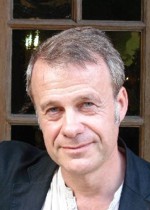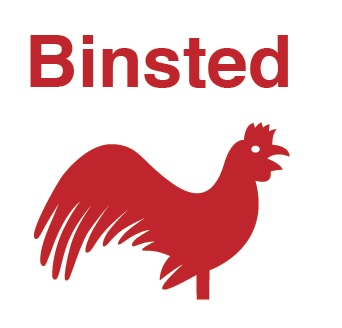Binsted Arts 2018 Poetry Competition
Original unpublished poems were invited, for prizes of £150, £100, £50, on the theme:
" Country "
WINNERS ANNOUNCED
 Our judge Jeremy Page is the author of seven collections of poems and has edited The Frogmore Papers since 1983. He has now let us know his choice:
Our judge Jeremy Page is the author of seven collections of poems and has edited The Frogmore Papers since 1983. He has now let us know his choice:First prize: Mandy Pannett for ‘The Scheme of Things’
Second prize: Neil Elder for ‘No Reception'
Third prize: Joan Michelson for ‘ 50th Anniversary of English Studies’
These three poems and the judge’s report can be read below.
Winning Poems and Adjudicators Report
The scheme of things by Mandy Pannett
A day-dreamy walk on the chalky hillsand your mind sinks down through a bed of blue clayto a sea that is shallow, warm and greenwith algae, shells of tellina, the scales and teethof primordial fish.How steamy and airless it is –but how beautiful, that huge dragonfly.See how sunlight through the mistflickers on its wings’ fine traceries.Can you feel the beginnings?Smell rivers and ancient rain?You scramble your way to the surfacepassing an ooze of willow, moss, decaying oak,past layers of rocks, the carapace of quartzand pyrite gold.These are memories deep in the soil.Here is your country:a patchwork of white and green.Eastwards, beyond your horizon, are lands that seemalmost emptyexcept for rubble and glass.Westwards, there’s plenty –though insufficientfor those who suffer the plight of sleet,shiver in cardboard and rags.This is your countryand you, existing now in the scheme of things,are miniscule as plankton.
No Reception by Neil Elder
After a while we leave the footpath,continuing in comfortable silence,each wondering how we can turn today into forever.Life must still be happening to people,shops will be open, traffic is stacking up,and we must believe that there are passengersin planes that pass overhead.But out here, where we have no reception,there’s sky, fields, crow crested trees and us.The sun is splashing through leaf coverand I squeeze tight shut my eyesto see a kaleidoscope rush of yellow and green.Only when we see the burnt out car,that’s flattened a path into wheat,do we feel the tug of our lives,hold our phones up highand search for a signal.
50th Anniversary of English Studies by Joan Michelson
From New York and some years in London,still young enough to be mistakenfor a student, and regularly mistaken,I came to Wolverhampton in the Black Country.I’d taught but I’d never lectured and the subjectdriving English Studies forward was Culture:Black Country under the new umbrellaof Sub-Culture, Popular and Media.The room for interview was off The Marble.The table, hardwood, spacious, had chairsto seat a board of twenty. We were four,three mild men of middle years plus one,young me. My past in million-people citiesand my gender were in my favour, althoughI was out of sync, a Flower Childdressed in Indian vintage to the ankle.The men felt far away as if allowingthe Atlantic ocean to flow between us,although I had already crossed it. In turneach ran his questions at me. I threw backso fast, I guess they thought I knew the world,or the world was New York’s Greenwich Village,which the Head, ex-RAF, dropped in like a pelletsince once on a week’s leave, he’d been there.And so it went. Turned up too high, enthusiastically,and a bit creatively, I bubbled over. My answerswere digressions that fast-blossomed into projects.I offered subjects they had not thought of:The Holocaust, Creative Writing, Foreign Literaturesin English. Who can fathom their decisionto have me come on board? Or calculate how muchI had to learn about the culture of the Yamyam?
Adjudicator’s report
I looked for poems that most imaginatively engaged with the notion – or notions – of country, with or without the article, definite or indefinite. And I was delighted to find work that approached the theme from a wide variety of angles and perspectives, some perhaps predictable, others markedly less so. There were poems that conflated ‘country’ and ‘countryside’, and the best of these did so in ways that went far beyond the mere celebration of landscape or some bucolic idyll. Others engaged with country in the sense of nationhood, which seemed wholly apt and appropriate to the times we are living through. I found myself wondering how many poems might have addressed the circumstances of the Windrush scandal had the competition’s timing been different. In most cases the connection between poem and theme was obvious, but there were some entries where I had to work harder to uncover the link, and others – a very small number – where I ultimately failed to do so. But overall it was the variety I was most impressed by, and which made the tasks of reading and rereading so fascinating.
The winning poem ‘The scheme of things’ struck me as the most ambitious attempt to explore the idea of ‘country’. This is confident work, from the first line – ‘A day-dreamy walk on the chalky hills’ – which so economically sets the tone, to the final line which reminds us that ‘in the scheme of things’ we are ‘miniscule as plankton’. On first reading I was unsure of those final words, but subsequent readings revealed to me how carefully they had been prepared for. This is a fine, memorable poem, which conveys a huge amount in its 28 lines and warrants very careful attention.
‘No Reception’ is a very different kind of poem, but one that similarly creates an utterly compelling mood. The poem explores what it means to have ‘no reception’ in today’s world, where connectivity is the order of the day and we are all awash with information. Two people, perhaps a couple – ‘each wondering how we can turn today into forever’ – find themselves deep in the countryside with no reception, only ‘sky, fields, crow crested trees and us’. The quality of the experience is noted and celebrated until, in the final stanza, the reader and the couple are confronted by the sudden, brutal intrusion of the world in the shape of a burnt out car, and the couple are compelled to ‘hold our phones up high/and search for a signal’. The poem is an artful exploration of what it means to have ‘no reception’ and the ultimate impossibility of it.
‘50th Anniversary of English Studies’ feels like an intensely autobiographical poem, but one that very successfully navigates the territory between the personal and the universal. The world is present in the poem in so many forms, both local – the ‘Black Country’ – and more exotic – Greenwich Village. The mundane context of a job interview is used to explore notions of nationhood and identity, with the Holocaust bravely juxtaposed with ‘Creative Writing, Foreign Literatures/in English’ in a way that manages to be the opposite of trivial. I loved the ending of this poem: ‘Who can fathom their decision/to have me come on board? Or calculate how much/I had to learn about the culture of the Yamyam?’
The highly commended poems were all very much in the frame for a prize until very late in the adjudication process. All have much to recommend them and will handsomely repay the courtesy of attentive re-reading. Similarly, those I have commended are characterised by beautiful writing, some truly memorable lines and a deeply felt and imaginative engagement with the notion of ‘country’.
I would like to thank everyone who submitted poems for this competition, which it has been a true privilege to adjudicate.
Jeremy Page
May 2018
Highly Commended:
- Paul Stephenson for ‘Kingfisher’
- Grace Gauld for ‘Gifts’
- Miriam Patrick for ‘Reaching the Trough’ and ‘Coxheath’
- Shelly McAlister for ‘Anniversary’
- Caroline Gilfillan for ‘May Blossom on the South Downs’
Commended:
- Bert Milsom for ‘Vendee Eclogue’
- Jeff Vinter for ‘A Winter’s Journey’
- Fay Marshall for ‘Fatima’
- Sheena Odle for ‘Holding’
- David Slade for ‘Country Laments’
- Sue Davies for ‘His Country’
All the winners’ poems will be published, where agreed by their authors, in our Binsted Arts Poetry Anthology 2018, along with a further selection of the best poems entered.
The anthology will be available for sale at the Binsted Arts Festival, 8-10 June. Those with poems included will be sent one free copy each. Copies will also be obtainable after June 10 on request from the Competition Secretary, at Shirley Park, Yapton Lane, Walberton, Arundel, BN18 0AN, or via e-mail camillalambert@talktalk.net for £4.00 (plus p and p).
We look forward to welcoming you at the prize-giving evening, on the first day of the Binsted Arts Festival, Friday 8 June, at 7.30 in Binsted Church, when you can hear the prizewinning and commended poems read out, as well as a reading of his poems by Jeremy Page, our judge. This is a free event, but we would appreciate knowing if you intend to come as the church is only small.
To book: email: bafbooking@edmart.plus.com. or phone: 01243 555778.
The competition entry instructions were as follows:
Poems, with entry forms and fees (cheques made out to Binsted Arts)
should be posted to:
Competition Secretary
Shirley Park, Yapton Lane,
Walberton, Arundel, BN18 0AN
to arrive by the closing date of Monday, April 9, 2018
Prizewinners will be invited to read their poems in Binsted Church (BN18 0LL)
during the poetry evening, one of the events in the 2018 Binsted Art Festival,
on Friday 8 June, 2018 at 7 pm
For full details of the Binsted Arts Festival visit
Binsted Arts Poetry Competition Entry Form 2018
- click here to download a Word copy
- or click here for a pdf copy
Name...................................................................................
Address...............................................................................
……………………………………………………………………………
Postcode………………………………………………
Email...............................................................
Phone number.................................................
Title(s) of poems submitted
I enclose a cheque payable to Binsted Arts for £.........
Terms and conditions:
Entry fee: £5 for the first poem, £3.50 for subsequent poems
Send 2 copies of poems, each on a separate sheet, with entry form, to:
Competition Secretary, Shirley Park, Yapton Lane, Walberton, Arundel, BN18 0AN
No author names on poems - personal details to go on entry form.only
Poems must be the original work of the named author and must not have been previously published or won a prize in any competition. Poems being submitted to other competitions can be accepted subject to withdrawal if another prize is awarded before winners in this competition are notified of placings.
Poems must not exceed 40 lines, must be typed, single spaced, in Times New Roman 12 point.
The judge will read all entries and his decision is final. Copyright remains with the author. Winners and commended authors may be asked if their poems can be included on the Binsted Arts website and in a small anthology.

